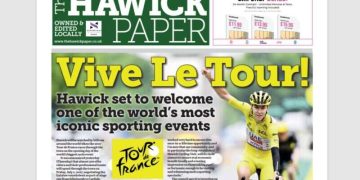
A newsroom boss at The Times has described two fake interviews recently run by the newsbrand as “humiliating” and said “absolutely basic” questions were not asked.
Times associate editor Ian Brunskill told staff: “Twice in the past few weeks we’ve been caught out by fake interviews. One involved a bogus Al-generated case study provided by a dubious PR outfit, the other a fake email purporting to come from a high-profile figure in US politics…
“We should have been on our guard. We should have tried much harder to speak to the people concerned. If that’s not possible, why not?”
One of the incidents was revealed in September by Press Gazette: The Times was among major UK and US newsbrands to publish interviews with ‘Anne Simmons’, a purported royal cleaner who claimed to have worked for the Royal Family for more than a decade.
However there appears to be no record of someone called Anne Simmons having worked for Buckingham Palace or been vetted by security.
The articles, which largely shared cleaning tips from Simmons, appear to have been based on press releases sent out on behalf of a number of companies that claimed to have interviewed Simmons including: Edit Suits, Plumbworld, Playcasino, Plates Express and Pure Window Cleaning.
The Times appeared to have run with the story first in March, with a piece headlined: “How do you spruce up Buckingham Palace? A royal cleaner spills.”
The news website, and sister News UK brand The Sun, removed articles about Simmons after Press Gazette questioned their authenticity. Other publishers to have published “interviews” with Simmons included the Daily Mail, Daily Express, New York Post and Daily Mirror.
Press Gazette editor-in-chief Dominic Ponsford has called on the Independent Press Standards Organisation, which regulates all of the UK publishers above, to investigate the “systematic failings which lead publishers to keep running fake, likely AI-generated, PR content”.
Press Gazette has in the past few months uncovered around 100 examples of articles published by IPSO member publishers containing fictitious information supplied by dubious PR companies that went unverified before being published.
Ponsford said: “IPSO-regulated publishers should be the last publications to be fooled by this stuff but they appear to be among the first.”
Wrong Bill de Blasio: ‘They accepted my quote without vetting’
Then, last week, The Times published a supposed interview with former New York mayor Bill de Blasio about the policies of Zohran Mamdani, the frontrunner in the city’s current mayoral race.
De Blasio denied having given the interview and a Times spokesperson said its journalist “had been misled by an individual falsely claiming to be the former New York mayor”. The article was removed.
However Semafor revealed the journalist had emailed the wrong De Blasio and had inadvertently contacted a Long Island wine importer by the same name (but spelled as DeBlasio without a space).
That De Blasio told Semafor: “I never once said I was the mayor. He never addressed me as the mayor. So I just gave him my opinion.”
He also dispute the statement put out by The Times, telling the Associated Press: “In no way shape or form did I call myself the mayor. The reporter addressed me as Mr. DeBlasio and I answered him as Mr. DeBlasio. They accepted my quote without any vetting – now they’re blaming me?”
Times memo: ‘Serious damage to our reputation’
In a memo sent to staff at the end of last week, first reported by Deadline, Times associate editor Ian Brunskill urged the newsroom to ask more questions when speaking to sources.
He wrote: “The first hoax (which others fell for too) prompted not just ridicule but calls for the press regulator to launch a full investigation into standards. The second (our own “exclusive”, alas) led to a widely reported retraction and apology.
“Both humiliating episodes did serious damage to our reputation. Both could have been avoided by good practice and due diligence.
“There were red flags. An unknown PR company with no telephone number offering to put us in touch with an unknown ‘expert’ who could be interviewed only via email was one. A well-known public figure expressing a view completely at odds with his previous statements, and doing it from a personal Gmail address, was another.”
Listing questions that ought to have been asked, Brunskill continued: “We – reporters and editors – should be asking: Who is telling me this and why? How do I know they’re who they say they are? How plausible is what I’m being told? What can I do to check?
“Those questions are absolutely basic. Asking them should be second nature to anyone working for a paper with a long history of trusted reporting. There are no excuses.
“As a condition of employment, we’re bound by the Editors’ Code. It requires us to take care to avoid inaccuracy. If there’s a complaint, IPSO will expect us to show precisely what taking care involved. We can’t afford to be fooled.”
A spokesperson for IPSO said last week: “Press Gazette’s valuable reporting on the emerging phenomenon of AI-generated press releases is a useful reminder to editors and journalists of risks posed by large language models.
“Those regulated by IPSO are accountable for their content and must take care to satisfy themselves that their sources are accurate.
“The standards they have agreed to meet set them apart from non-regulated titles and help to maintain trust and credibility with readers.”
The post Times journalists urged to make ‘basic’ checks after two ‘humiliating’ hoaxes appeared first on Press Gazette.



























